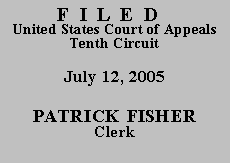

|
PAUL INMAN, |
|
Before BRISCOE, LUCERO, and MURPHY, Circuit Judges.
After his convictions were affirmed on direct appeal, Inman sought post-conviction relief pursuant to Rule 35(c) of the Colorado Rules of Criminal Procedure. Inman argued, inter alia, that the trial court erred when it accepted his waiver of counsel's conflict because he was effectively forced to waive his constitutional right to conflict-free counsel in order to preserve his right to a speedy trial. See Simmons v. United States, 390 U.S. 377, 394 (1968). Inman's Rule 35(c) motion was denied. The Colorado Court of Appeals affirmed the denial, concluding that the record did not support Inman's contention that a waiver of his right to a speedy trial was inevitable unless he waived his right to conflict-free counsel.
Inman filed a pro se § 2254 petition in federal district court and the court appointed the Federal Public Defender to represent him. After the conflict issue was briefed, the district court denied the § 2254 petition, rejecting Inman's argument that the state court's determination was an unreasonable application of federal law. See 28 U.S.C. § 2254(d). Specifically, the district court concluded that the state court's determinations that Inman's waiver was valid and that Inman was not forced to surrender one constitutional right to assert another right(*) were supported by the record.
This court cannot grant Inman a COA unless he can demonstrate "that reasonable jurists could debate whether (or, for that matter, agree that) the petition should have been resolved in a different manner or that the issues presented were adequate to deserve encouragement to proceed further." Slack v. McDaniel, 529 U.S. 473, 484 (2000) (quotations omitted). In evaluating whether Inman has carried his burden, this court undertakes "a preliminary, though not definitive, consideration of the [legal] framework" applicable to each of his claims. Miller-El v. Cockrell, 537 U.S. 322, 338 (2003). Inman is not required to demonstrate that his appeal will succeed to be entitled to a COA. He must, however, "prove something more than the absence of frivolity or the existence of mere good faith." Id. (quotations omitted).
This court has reviewed Inman's appellate brief, the district court's order, and the entire record on appeal pursuant to the framework set out by the Supreme Court in Miller-El and concludes that Inman is not entitled to a COA. The district court's resolution of Inman's claims is not reasonably subject to debate and the claims are not adequate to deserve further proceedings. Accordingly, Inman has not "made a substantial showing of the denial of a constitutional right" and is not entitled to a COA. 28 U.S.C. § 2253(c)(2).
This court denies Inman's request for a COA and dismisses this appeal.
Entered for the Court
PATRICK FISHER, Clerk of Court
By
Deputy Clerk
*.Inman's right to a speedy trial arose pursuant to state statute, not pursuant to the Constititution. See Colo. Rev. Stat. § 18-1-405.